Filters
Product Categories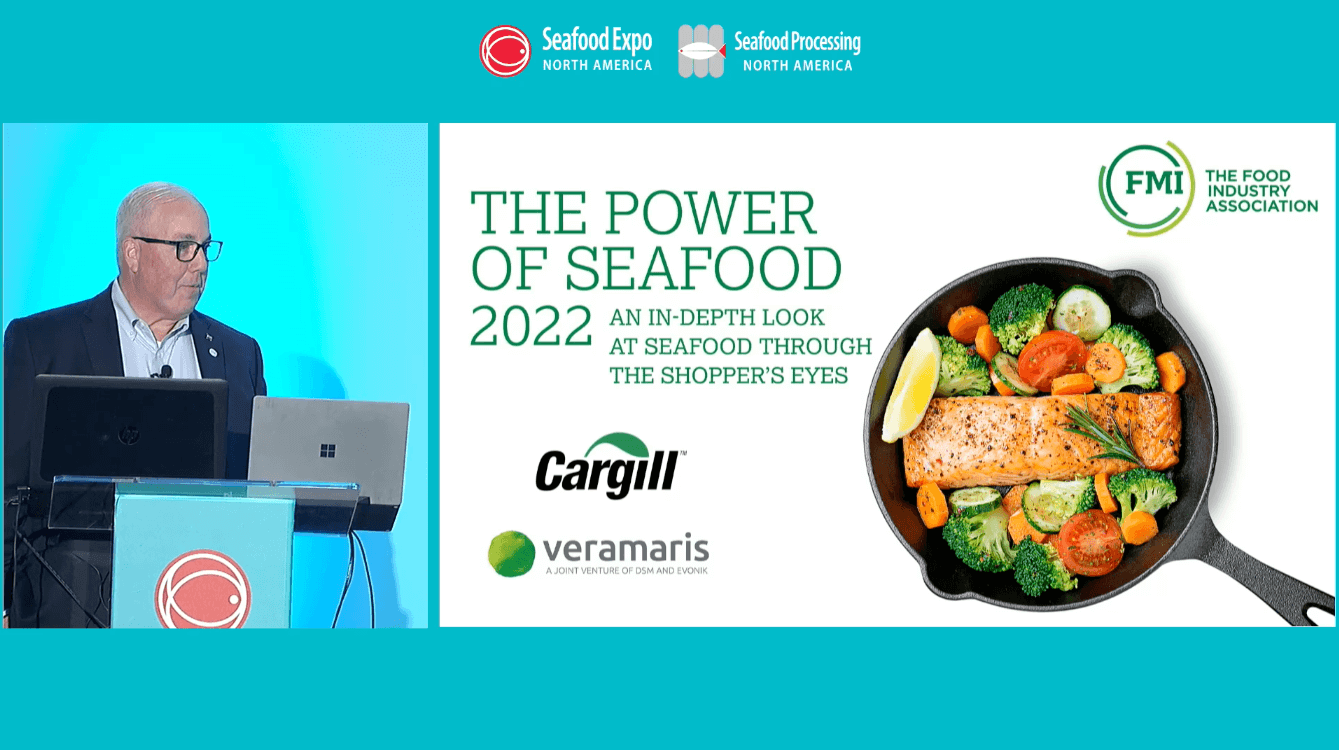
Moderator: Rick Stein, FMI
Speakers:
- Rich Castle- Giant Eagle
- Steve Markenson – FMI-Food Industry Association
- Guy Pizzuti- Publix
- David Wier - The Fishin' Company
The annual Power of Seafood report has become a staple of research for the supermarket industry. This is our 4th annual consumer survey. Our insights into shopper behavior and data provided is considered a tool for retailers in their efforts to grow seafood sales. We explore why consumers are buying what they are buying and why they are not buying what they are not buying. We utilize IRI data to compare the answers consumers give us, to what is actually happening. This comparison gives some real insights into how the consumer is navigating the seafood counters. We will address issues like sustainability, social responsibility and overall seafood sales growth since the pandemic. We will have a panel of retail experts weigh in on how they utilize this data to go to market. Join us as we present the survey results and speak with industry leaders on how they utilize this information in the business.
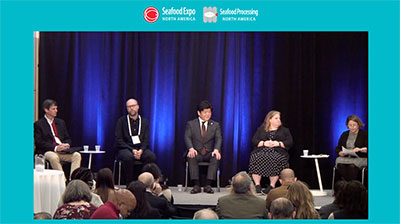
Moderator:
Sally Yozell, Stimson Center
Speakers:
Alexa Cole, NOAA Fisheries
Wakao Hanaoka, Seafood Legacy
Andy Hickman, Seafood Ethics Action (SEA) Alliance
Dr. John Virdin, Director, Duke University
A lack of transparency pervades the seafood supply chain at every level, across both industrial and artisanal fishing, and aquaculture, impeding effective fish stock management and enforcement against illegal, unreported and unregulated (IUU) fishing, as well as fair labor practices. The opaque nature of the seafood supply chain heightens the risk that distant water fleets, small-scale fishers, processors, and fishing companies may engage in IUU fishing and seafood fraud. Consumers want to know that the fish they purchase is not part of illicit activities, labor abuses or undermining seafood sustainability. Recognizing that transparency must be broadly adopted throughout the seafood supply chain at all levels, there has been growing engagement by a wide set of international stakeholders. This panel will explore changes in the market expectations and the latest efforts to expand seafood transparency by civil society, industry, and government. It will also highlight new findings and recommendations from a forthcoming comparative study of transparency initiatives adopted in non-seafood sectors that can offer valuable lessons to increase the reach and effectiveness of seafood transparency initiatives. To combat IUU fishing and gain a greater understanding of the seafood industry’s impact on fisheries sustainability, labor practices, and the economic security of coastal states, there is a growing demand for publicly available information about fishing industry practices and operations.

A LEAP FORWARD FOR TRACEABILITY - An Introduction to the Global Dialogue on Seafood Traceability and How Voluntary GDST Standards Will Affect the Industry
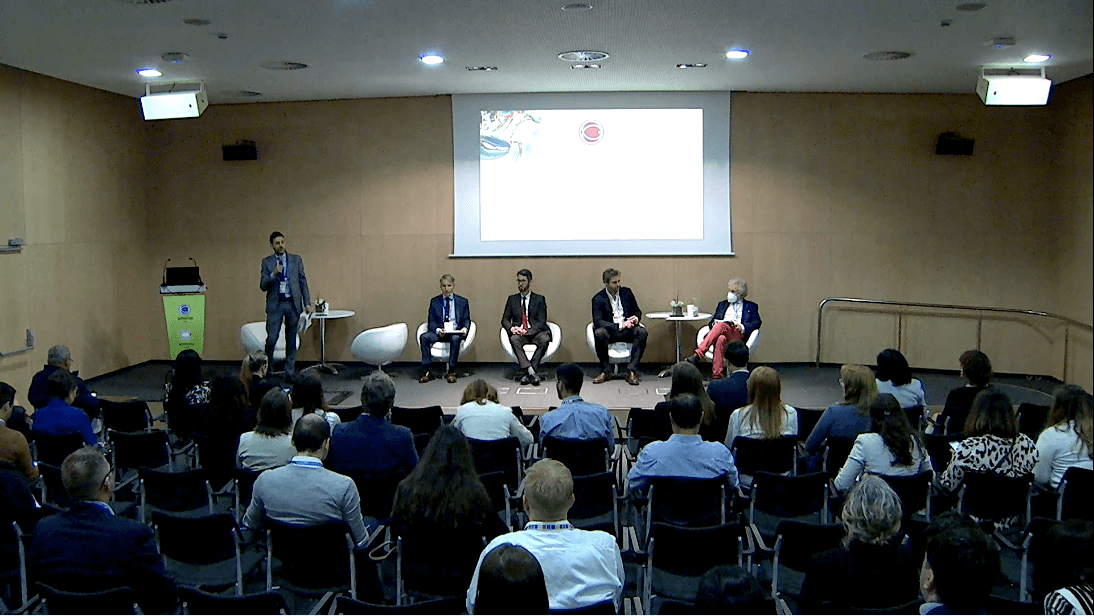
Speakers:
Alessandro Pititto
Audun Lem
Roberto Carlos Alonso Baptista De Sousa
Esben Sverdrup-Jensen
Christophe Vande Weyer
COVID-19 has posed many a challenge to the seafood sector, but it has also opened new opportunities. Two years into the pandemic, it is high time to focus on new business opportunities, emerging markets, changes in consumer behavior and new factors to penetrate the markets. The workshop will see policy makers and business professionals discuss the future of the seafood sector in the post-COVID-19 world.

Seafood2030 Speaker Series: Precompetitive Agreements and Transformation Pathways in Seafood

Access all available Seafood Expo Global 2023 conference session videos.

New, 1-Year Master’s in Ocean Food Systems from UNE
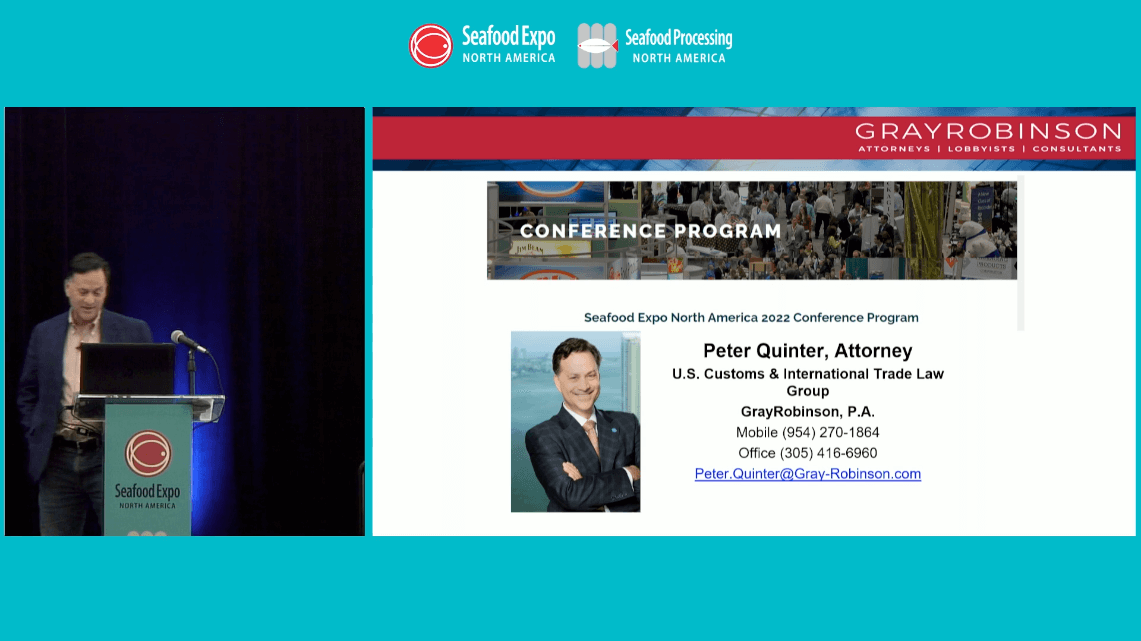
Moderator: Peter Quinter, GrayRobinson, P.A.
Speakers:
Dean Leaman, Certified Group
Todd Owen, Cross Border Advisory Network, LLC
The two major Federal law enforcement agencies, Food and Drug Administration (FDA) and U.S. Customs and Border Protection (Customs) regulate the importation and distribution of seafood and fishery products in the United States. The FDA uses a methodology to target and inspect imported seafood, then allow it to proceed or refuse its entry into the United States. Customs also targets and inspects seafood shipments and has a new Withhold Release Order process to prohibit the importation of seafood made with forced labor. Customs continues collecting antidumping duties on shrimp from India, fish fillets from Vietnam, and many other seafood products from around the world. There are several penalties for importing misbranded or adulterated seafood. Learn how to lower your risk of being targeted and what to do when your seafood is selected for examination or your company has been added to the FDA's Import Alert list.
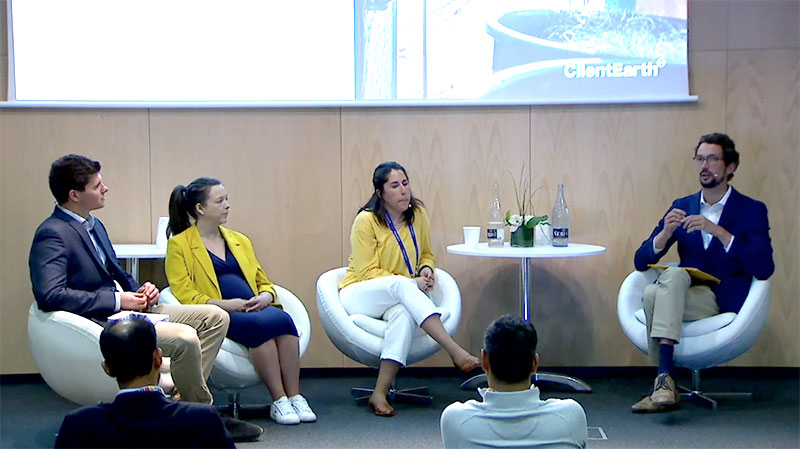
Precompetitive collaboration in the seafood industry has been at the forefront of transformative change towards improved seafood sustainability in supply chains internationally. For the past 10 years, collaborative industry platforms have multiplied in various markets around the world. These initiatives span various geographies and cover a range of topics. Some focus on a country whilst some aim to address transversal sustainability challenges faced by the sector. Over the years, these platforms have accumulated invaluable experience. We know today that there is no one size fits all solution, and that there are incredible differences between different seafood markets which justify the need for different approaches and modus operandi of these initiatives. This year, the Sustainable Seafood Coalition (https://www.sustainableseafoodcoalition.org/) is looking back at 10 years of collaboration in the UK seafood industry, an excellent milestone to reflect on the journey and the main successes and challenges along the way. As believers that buyers have a significant role to play in improving the fishery (or aquaculture activity) they source from, our session aims at providing a space to reflect on achievements of the SSC after 10 years and together with upcoming opportunities, and compare with similar initiatives in another geography, including the “Plataforma por la Sostenibilidad Pesquera” (https://www.es.clientearth.org/que-es-la-plataforma-por-la-sostenibilidad-pesquera/) a precompetitite platform in Spain. Taking into account the post-Covid economic and political context together with the context of a once in a generation European Green Deal to make our economy more sustainable, the participants will reflect on future opportunities to step up commitments and international collaboration further to strengthen the seafood sustainability agenda.

Eliminating Forced Labor in U.S. Supply Chains





